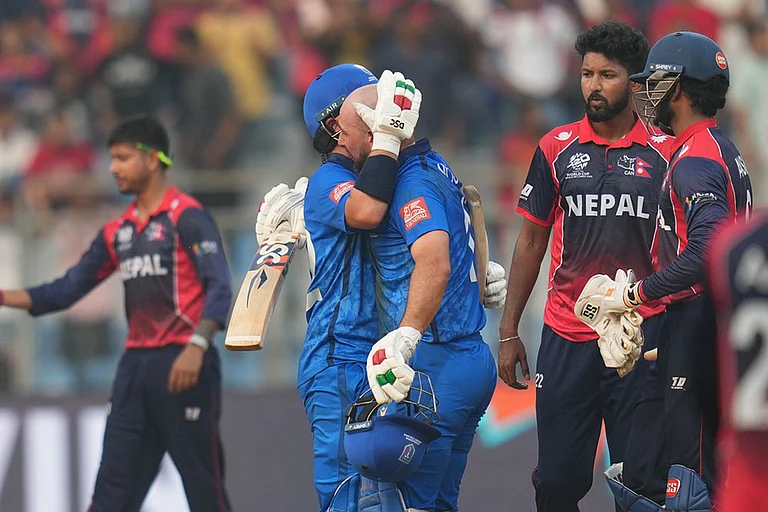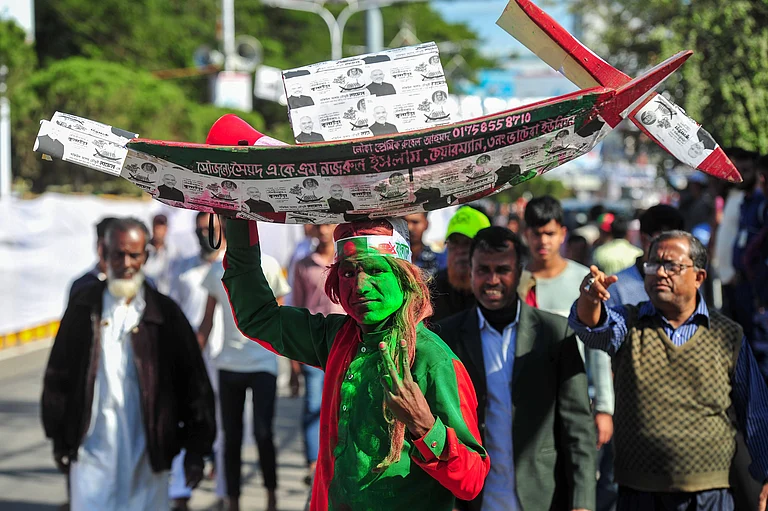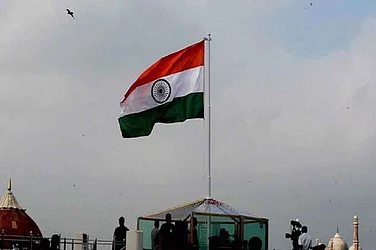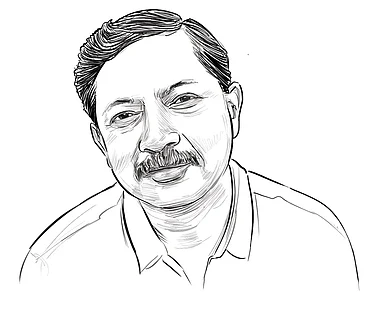Gaav seher ke bichwa mai
Hum gajbe kanfusiaailbani
Do joon je roti khatir
Bombai mai hum aail baani
(Between village and town of mine
I lie a bit bewildered
To feed two tummies no more
To Bombay I have wandered)
About a month after actor Manoj Bajpayee crooned the runaway hit Bhojpuri rap Bambai Me Ka Ba in September 2020, the BJP came out with a similar-sounding song ahead of the assembly elections to highlight the “progress” of Bihar under the NDA government. The BJP’s song, Bihar Mein Ee Ba (Bihar has all these), used the same tune as Bajpayee’s song but was far removed from what the original intended to portray—the hardship and agony of Bihari migrant workers in Mumbai. Neha Rathore, a Bihari folk singer countered the BJP with her own version, Bihar Me Ka Ba? (What does Bihar have?) to take pot-shots at chief minister Nitish Kumar.
Fast forward to 2022. This election season in neighbouring Uttar Pradesh, spin-offs of Bajpayee’s rap song are setting the tone for the political battle between the ruling BJP and the challengers to the throne. And then there are other foot-tapping songs by different political parties in the fray, trying to woo voters with musical and lyrical interpretations of their visions or to expose alleged shortcomings of their opponents.

Bihar Me Ka Ba? (What does Bihar have?) By Neha Rathore
David Claman, a composer and music professor at Lehman College-City University of New York, tells Outlook: “Music used in political campaigns usually does not convey a specific political or policy message. More likely it attempts to convey some kind of positive attitude about the candidate or party.” In 2019, when Bernie Sanders declared his candidacy for US president, his campaign theme song was John Lennon’s Power to the people. A song that gave the impression that Sanders represented the same political ideology that Lenin espoused. Joe Biden used Bruce Springsteen’s We take care of our own—hinting at liberating the country from the “selfishness and greed” that the Democrats claimed had engulfed America during Donald’s Trump presidency.
***
In India, however, campaign music goes beyond being just “positive attitude”. It often becomes the leitmotif of an election. With internet and mobile telephony penetration deep into the Indian heartland, political parties can now reach out to a large section of the rural population and speak to them in a language loved and understood by all: music.

UP Me Sab Ba (UP has everything) By Ravi Kishan
So, when BJP parliamentarian Ravi Kishan released his own version, UP Me Sab Ba (UP has everything) ahead of the seven-phase polls starting February 10, he was well aware of the memetic appeal— capacity for cultural transmission—of the highly-popular tune.
Dressed in saffron, the actor-turned-politician’s song is in fulsome praise of Yogi Adityanath’s “achievements” during his tenure as chief minister. Kishan adds his own elements to elevate the song—he introduces himself with his full name, Ravi Kishan Shukla (a Brahmin caste), to challenge the opposition’s claim that Brahmins were turning against the CM. Kishan also invokes Gorakhnath, the patron saint of those following the Nath tradition. Yogi Adityanath is contesting from Gorakhpur where the Gorakhnath temple is located.
Singer Neha Rathore countered, once again, with her own version, UP Me Ka Ba? (What does UP have?), talking about issues like unemployment, farmers’ protests, women’s safety. “I sang this song on public demand. Whatever was happening around me, like students being beaten up, farmers protesting…. It compelled me to write this song,” Rathore tells Outlook. As the song went viral across different media platforms, the BJP took the game one step ahead with UP Me Ee Ba (UP has all these), another campaign song that highlights “progress and development” in the past five years. Speaking on the recycled themes, Claman says, “Political parties don’t care about composition much. They focus on ‘lyrics’ and some memetics. They don’t focus much on creating something fresh and new but to use existing templates.”
***
However, not all campaign songs this election season are rip-offs. With elections being held in five states under the shadow of the Covid pandemic, parties have been forced to take most part of their campaigning online, including holding virtual rallies. And music has become even more important for the parties and candidates to reach out to their target audience. And it also allows the parties to micro manage their campaign by addressing the voters in their own language o dialect. “Any political campaign and movement requires a spirit to move on and the spirit needs to be directed to the last person. And music does that. Music keeps them together,” says Hema Sain, a researcher at Delhi University. “The dialect can make a huge difference to the targeted audience. Political songs are often in simple lyrics and catchy beats with no complexity of compositions. So, it’s easy for everyone to sing along to keep the spirits high…The lyrics and the music make any issue the issue of the masses.”
For the Congress, the campaign song is a direct reflection of the party’s USP—40 per cent of its candidates are women. Pushed to the margins of the state’s polity, the Congress is banking heavily on women voters to regain lost ground in the state. And its campaign song—Ladki Hoon Lad Sakti Hoon (I am a girl, I can fight)—speaks directly to the target audience. The song starts with the hymn, Aigiri Nandini, dedicated to Goddess Durga and is set to the tune of a popular devotional pop song. However, neither the video nor the lyrics say anything about the Congress’s vision for the state.
In contrast, the Aam Aadmi Party’s theme song, Pahli Pahli Bar Jhadu Chaap Aaya Hain sounds like typical Bhojpuri pop with lyrics that are typical of the party’s campaign in each state—claiming that the party has “come to change politics” and clean the state of “political garbage”. The Bhojpuri singer who sang one of the several songs says on condition of anonymity, “A party member came to me saying they needed a musical dance number that will remain in people’s minds.” The AAP’s official UP song was unlike its campaign number for Punjab, Ik Mouka Kejriwal Nu, Ik Mouka Bhagwant Maan Nu (One chance for Kejriwal and CM face Bhagwant Mann), which is well thought out and focuses on the party’s plans for the state–women’s welfare, education, infrastructure, etc.
One of the best examples of successfully using music as a campaign tool was the BJP’s campaign for the 2014 Lok Sabha polls. Coming in the wake of the anti-corruption movement led by Anna Hazare, the BJP launched a sustained campaign to project the incumbent UPA government as “weak” and “indecisive”. Projecting Narendra Modi as the prime ministerial candidate, the BJP reached out to the people with the very hummable track titled Acche Din Aane Waale Hain (Better days are coming). The song’s tune turned into the BJP’s signature theme, sparking a Modi wave that was encapsulated in another campaign song by the BJP, Abki Bar Modi Sarkar (This time, it will be a Modi government). In fact, the BJP made an overkill with another song, one which projected chest-thumping nationalism in keeping with its image as a nationalistic party. The song, Saugandh Mujhe Iss Mitti Ki, Desh Nahin Jhukne Dunga (I swear by the soil of this land, I will not let this land down) went on to become a hit and the party used it again in the 2019 Lok Sabha polls.
For the 2019 parliamentary polls, the BJP attempted to project every citizen as a ‘watchman’, in line with Modi’s well-publicised promise that he would protect the country like a ‘chowkidar’. The BJP song, Mai Bhi Chowkidar (I am also a watchman), was, however, more in response to Congress leader Rahul Gandhi’s diatribe at the Prime Minister, “Chowkidar chor hai” (The watchman is a thief). The chorus of the song, set against patriotic imagery, set the tone that supporting Modi was a patriotic act. These songs were more about Modi than the BJP. It was also the time when the BJP gave another call to the voters through a song, Chalo Phir Ek Bar Modi Sarkar Banate Hai (Let’s make a Modi government again), which was also very well managed on memetics.
***
For this election too, the BJP’s theme song for UP weighs in on an appeal of prolonging the incumbency. The song, titled UP Phir Mange Bhajpa Sarkar (UP wants a BJP government again) shows visuals of major cities and tries to capture the interests of all stakeholders. The song also subtly invokes Hindutva with images of god and monks, but avoids directly addressing it.
If songs were to ensure a party’s winning chances, the Samajwadi Party would be the runaway victor with so much music accompanying its campaign. Seen as the most serious challenger to the BJP’s quest for a second term, the Akhilesh Yadav-led party has experimented with several genres of music, including a rip-off on West Bengal chief minister and Trinamool Congress chief Mamata Banerjee’s iconic ‘Khela Hobe’ slogan. Titled Khadera Hobe (There will be a chase-out), the song is one of several in the SP’s kitty though the jury is still out on its efficacy.
The initial songs of the party tried to capitalise PM Modi’s mocking comment on the SP’s ‘lal topi’ (red cap). One such song, Ye Lal Rang Ki Topiya (This red cap) had an interesting revolutionary zeal hinting at a revolt of socialism against Hindutva. However, the song sounded a bit dissonant and harsh and was quickly sidelined because it didn’t go well with the performative theatrics of the elections. Another song of the SP is Hunkara, which means battle cry. Released recently, this song too veers from memetics and takes an issue-based approach to attack the incumbent government on its governance “failures”. One of SP’s earlier campaign songs, Janta Pukarti Hai Akhilesh Aayiye (The people are calling, Akhilesh do come)—sung by Altamash Faridi—was along the same lines but it sounded more like a Bollywood romantic number. Without the usual peppy beat of campaign songs that rouses the people, this song failed to make much of an impact.
***
Despite the huge success of campaign music, most of the singers and songwriters remain unsung and unheard. Some are even unpaid. Hardly any credit is given to any singer or writer unless they are party workers or supporters, like Bollywood singer Vishal Dadlani who composed AAP’s hugely popular and successful campaign song, Paanch Saal Kejriwal (Kejriwal for five years) in 2015. Pravesh Singh, a Jhansi-based music composer who has created music for various parties, says, “Candidates don’t understand music. They sometimes come with lyrics and demand music alone. But one thing that they make sure is, featuring their name 5-6 times.” Singh tells Outlook that production of one song costs around Rs 10,000 as local composers don’t charge much. Also, parties have their own set of writers and actors, so a music video doesn’t cost much. Also, as Claman says, there are not many specific campaign songs these days. “Now politicians borrow, often without permission, some pop song they feel captures the spirit of their campaign.” The tendency to “borrow without permission” has often led to controversies. In 2020, Bollywood director Anubhav Sinha had accused the BJP of blatantly plagiarising Bambai Me Ka Ba which he had produced.
Recently, poet Amir Aziz had protested the use of his poem Sab Yaad Rakha Jayega by the Congress for its campaign. Aziz had written the poem during the anti-CAA protests. He wrote on Twitter, “Main zinda hun? Mujhe laga mujhe mare 50 saal ho gaye, Shayad itna to kiya hi jaa sakta hai ke ek baar poochh liya jaye writer se uski kavita istemal karne se pehle? Nahi?!?? (Am I alive? I thought I died 50 years ago. Perhaps one can at least ask before using someone’s poem.”
***
Ladki Hoon Lad Sakti Hoon Congress theme song in UP
Pahli Pahli Bar Jhadu Chaap Aaya Hain AAP theme song in UP
Ik Mouka Kejriwal Nu, Ik Mouka Bhagwant Mann Nu AAP campaign song in Punjab
UP Phir Mange Bhajpa Sarkar BJP campaign song
Janta Pukarti Hai Akhilesh Aayiye Samajwadi Party campaign song


























